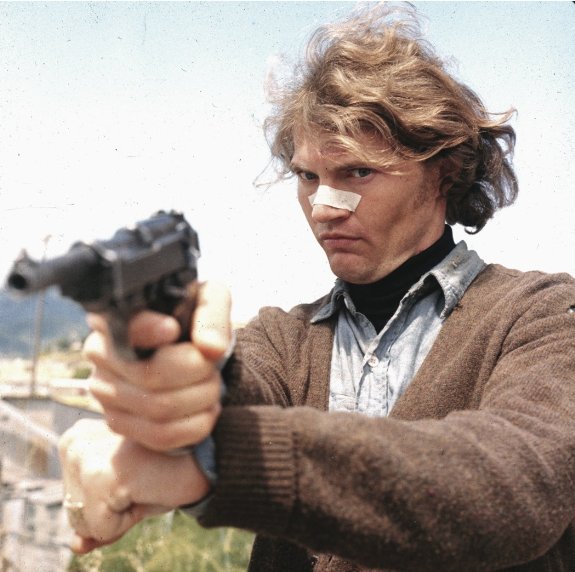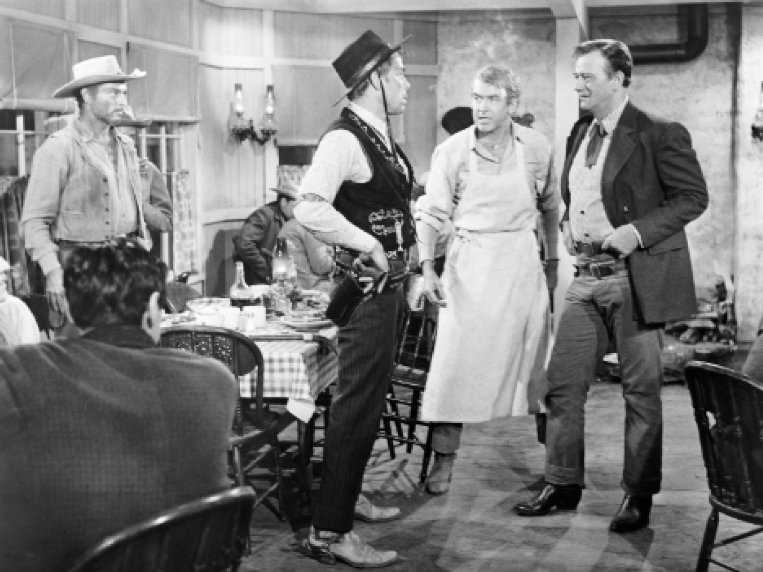Not every movie coming out of Hollywood is about destroying the social order. Here's a list of conservative films which double as great cinema.
Sex may sell, but there is a fairly sophisticated and successful genre of conservative film · Moral clarity, family values and support for the existing social order are values that can be found, especially in American films · We collected the "greatest cinematic hits" of conservatism · So get out the popcorn, bring the kids and enjoy the ride

Can 'Lassie Come Home' compete with 'Last Tango in Paris'? It would seem that the anarchist films with the radical tendencies have a built-in advantage in the competition for audiences. Cinema, shown on the big screen, invites the audience to let loose. That's why the audience came – not to be preached to about good values and morality. Films, especially documentaries, have always dealt in propaganda, usually the false kind. This is a discovery that film aficionados discover over the years, and the sobering effect is almost unbearable.
After all, two of the great early cinematographers were Hiter's propagandist Leni Riefenstahl, and Sergei Eisenstein – the Jewish-Russian director who conducted a fruitful discussion with Stalin for his films 'Ivan the Terrible' and 'Alexander Nevsky'. More extras died in his film October on the November Bolshevik coup than in the actual storming of the Winter Palace.
All the more reason to appreciate the geniuses who bucked the violent, anarchistic temptation and created value-laden films, some of which are conservative. It turns out you need a Frank Capra, Spielberg or John Ford to pull it off. There were also others, who were not consistent in the conservative message they expressed in some of their movies; in other movies they expressed radical ideas woven with an anarchist aesthetic. This problem is also built-in to cinema: film loves originality in cinematography and direction, something which practically invites chaos and anarchism.
So here are the great conservative films which overcame the built-in problems to enter the great cinematic pantheon.

- It's a Beautiful Life/Frank Capra 1948
The heart-warming story starring Jimmy Stewart. Capra spent much of his career making populist films dealing with the 'simple man'. He tried to connect his populism with American traditions. But 'It's a Beautiful Life' is the movie which families watch on Christmas. It's not a coincidence that it's shown on all the American TV channels on December 24.
James Stuart is a bank manager who's become depressed and decided to commit suicide. An angel saves him, showing him how life – how the world would look – if he did not exist in it. The scene in which he saves his little brother who fell through the ice is especially memorable. Thus Stuart recovers and returns to life.
Capra was a kind of lover of people; this already puts him as a conservative. I managed to hear him in Boston at the end of the 1970s. I only remember one thing he said: "If you have a real friend, that's all you need. If you have two real friends, they you're really rich." I can't believe I'm writing that, but those were his cinematic truths and it works.
- Straw Dogs/Sam Peckinpah 1971
A conservative outlook of an entirely different sort. There is evil, there are acts of aggression, there is no recourse but to stop the aggression, to restrain evil, and take what's yours. The movie wasn't politically correct in its own time. Today I assume that a theater owner who airs it can be arrested. The movie has everything: the young wife of a mathematician is sex-starved. Susan George, for those who remember. The mathematician is a young Dustin Hoffman. She strips in front of the window and Irish construction workers who renovate their house cheer. There is of course a rape scene which becomes a love scene in which the victim – the mathematician's wife – passionately cooperates. Eventually Hoffman, who would seem the last person to fight back against the wild animals who broke into his house, discovers the wonders of the sharpened iron trap. He learns what you can do to the skull of a violent lunatic with a metal spear with a curved edge.
Peckinpah reveals to the public that there is evil, aggression and primal urges, and no enlightened educational program will get rid of these. In order to stop these, you need to apply force. Maturity in this case means a willingness to use violence.
- Deliverance/John Boorman 1972
This movie was accused of being fascistic, but it works wonderfully until today. Perhaps because of its dynamism, the primal action, and the unending movement of what is at heart a cameri film. Here, too, is a film about a group of men from American suburbia who goes on a weekend trip involving kayaking down a river in a nice mountainous territory. A small weekend adventure turns into an insane survival struggle against a cruel, unpredictable and hostile nature. Worse – a group of mountain men who didn't get the memo about man standing erect and thinking logically.
One classic scene has an albino child with apparent mental retardation who is apparently a savant at the banjo. One of the four suburbanites who brought a guitar with him conducts a musical dialogue with him. It's as if he's saying – we can reach an understanding. But the suburbanite is killed later on. Two character survive: that of Burt Reynolds, a skilled adventurer who prepared himself from day one for challenges and danger, and that of Jon Voight, who starts as a somewhat nebbish idealist, until he discovers amazing strengths in himself – including, yes, the ability to kill.
- The Man Who Shot Liberty Valance/John Ford 1962
As opposed to its predecessors on this list, this John Ford film is completely aware of its conservative values and worldview. There's an outlaw, a violent thief named Liberty Valance played by the legendary Lee Marvin. There is a son of the town, played by James Stewart, who studied and eventually became a senator in Washington. And there's John Wayne, the good old gunslinger, who's ostensibly past his prime. One of Ford's hallmarks is that he doesn't deal in cinematic pyrotechnics, but directs with restraint, showing everything in his quiet and wonderful shots. That's his sophistication and depth. Ford's picture box has the unending depth of a field of vision.
When Liberty reaches the town, the inevitable clash occurs between him and Stewart, who is not afraid of a shoot-out. But in spite of his bravery, he has no chance. Nevertheless, shockingly, he is the one left standing, with Liberty dead before him. Ford shows us that John Wayne set himself up to conduct an ambush, knowing that the friendly and principled lawman had no chance against the violent gunman called "Liberty".
The message is clear for the men of law and politics: without people willing to play dirty for the good cause, you don't stand a chance. Ford captures the transition of a society from violent chaos to one of law and order. He knows that the time of Marvin and John Wayne is ostensibly over, but he reminds us what lays at the foundation of the rule of law. The result is a necessary and agreed upon lie: the movie left us with the saying "when the legend becomes fact – print the legend."
It's hard to think of an heir to Ford in the department of films which celebrate conservative values. Therefore we need to add at least one more film of his 'The Searchers' from 1956, which is considered by some critics as one of the greatest American films. This was a movie done by Ford who had experienced the horrors of WWII and became aware of the subject of genocide. It's a movie which deals directly with racist tendencies but confirms and strengthens values of culture and family.
The journey this time is of Ethan (the legendary John Wayne) who's searching for a member of his family who was kidnapped by Indians as a girl. This is a journey which embodies family reunification but also hands down an unequivocal verdict: the man who went on the critical mission will not reach the Promised Land but will remain alone in the wilderness like Cain. The movie ends with an unforgettable line, with Wayne swinging Natalie Wood in his arms: Let's go home.

- Schindler's List/Steven Spielberg 1994
This is of course one of the most prominent films on the Holocaust. It is a movie that did more to raise awareness of the Holocaust than any other cultural creation. But at its center is actually a German – Oskar Schindler – who saved over a thousand Jews. Where's the conservative thought in it? Not everyone would add this film; I do so because of the basic choice of "and you shall choose good". Here is a man, an individual, who at the critical moment decides to good, help and save lives. He faces off against another man – Amon Goeth – who chooses to do evil.
Spielberg shows how one man, a sworn individualist, somehow succeeds in affecting the world around him. All his weaknesses and ostensibly bad individualist traits are leveraged in the darkness for the ultimate good. He is a skirt chaser, gambler, egoist, addicted to the pleasures of corruption – yet all these serve as an effective tool in his rescue campaign.
The rescued Jews also maintain cultural values. The peak is a wedding ceremony. The Jews are portrayed as those who preserve the values of humanity and civilization. The arrival of the survivors to Israel has the dimensions of a modern Exodus –and Exodus of liberation and construction. Opposite Schindler's List I would place Django Unchained. This is the first time someone ties the freeing of the slaves in America to the kind of Teutonic myths Wagner used in his operas, in contrast to the old tradition that tied it to the Old Testament an the Exodus. Tarantino expresses a radicalism in his work that doesn't bode well.
- On the Waterfront/Elia Kazan 1964
Here's a risky statement: the same people who today set the intellectual party line, at the forefront of political correctness and progress, would have dealt with variations of Hitler's racial theories if he had won the war 70 years ago. In other words, all those 'radicals' are institutional conformists. Marlon Brando represents the character who can rebel against his suffocating environment trapped by its blindness.
The '54 movie deals with the question of informing on your buddies. In this case, it's the unions running New York Port. So first and foremost we have a movie which depicts a workers' union as a criminal mafia-like organization. But this is also an organization that demands unlimited loyalty, like the Communist Party in which Kazan was briefly a member twenty years before he made the movie.
Brando represents the archetype of those who can deviate from the party line, think independently, go against the group, and have an individual conscience. And this is the fate of any conservative who deviates from the dominant train of thought of his day. At the heart of the film is a love story between Brando and a girl played by Eve Marie Saint. At the end of the movie Brando undergoes a kind of Via Delarosa and ends up beaten and bleeding like Jesus. Kazan in this movie succeeded in justifying his cooperation with the US Congressional Un-American Activities Committee.
- Ben Hur/William Wyler 1959
A great spectacle of a movie, starring Charlton Heston with a touching performance by Israeli Haya Hararit. One cannot avoid including a faith-saturated movie like 'Ben Hur'. A great deal of Christian faith with Jewish roots and stubborn Jewish adherence to values. The movie's approach to Judaism is complex. The movie describes the period of Roman domination at the time of Jesus. But to take Charlton Heston, the greatest Hollywood actor at that time, and give him a character named Judah Ben Hur is a daring act. The name Judah against the background of the beginning of Christianity says something. The movie glorifies heroism and endurance in the face of suffering. The hero also portrays the prodigal son who returns to his family. There is also, of course, a roman style contest where the winner lives and the loser dies. This is the chariot race, one of the greatest actions scenes of all time. Parts of the movie were filmed in parts of Jerusalem in 1959.
- Dirty Harry/Don Siegel 1971
A movie entirely identified with Clint Eastwood, and you can't have a list of conservative movies without including something of Eastwood's. But this movie was directed by Don Siegel, so it was included as a gesture to Eastwood and his greatness as director of 'Unforgiven', 'Mystic River', 'A Perfect World' and 'Gran Torino'. Don Siegel is also the creator of a science fiction movie worthy of this list – the openly anti-communist 'Invasion of the Body Snatchers' from 1956.
'Dirty Harry' was a kind of response to the counterculture which developed in the west and especially American at that time – hippies, drugs &c. Dirty Harry is Police Inspector Harry Callahan who has to fight the corrupt police establishment and a murderous criminal born of the new world of the counterculture. It's him and his gun – the legendary Magnum – against the world. He's dying to put a bullet in the head of a criminal rather than arrest him as the DA would like. His immortal line: "make my day".
The movie was of course accused of being fascistic. But it's only fascistic to the extent that watching Fox News violates accepted ethics at Cambridge. He represented the correct basic instincts of the American public who desired "law and order" – the silent majority which brought Richard Nixon to power. There's no doubt that 'Dirty Harry's reputation has held up longer than that of Tricky Dick. You have to admit that neither Siegel nor Eastwood show much confidence in democratic institutions or the rule of law. But the argument is convincing: society is crumbling from internal ideological attacks, and when the rule of law is under pressure, society reverts to its situation before western civilization: the gun is law, just like Tombstone or Dodge City.
- The Man Who Knew Too Much/Alfred Hitchcock 1956
"Que Sera Sera, Whatever will be, will be." So sings Doris Day, the ultimate Blond family woman of the 1950s. Spying, child kidnapping, a subversive network – against all this evil the family must stand. Again, James Stuart as the simple man, the husband, who needs to fight for the cohesion of his family and to save his child. It's not Hitchcock's best movie. But it expresses more than anything his conservative outlook, especially when it comes to family. In his movie men and women were meant for each other – you only need to find the connection.
Only in America
There were entire genres which did not make it in even though they are part of a clear conservative outlook. For instance, blockbusters like Independence Day and other movies where the drama begins with 'Have a look at that'. On the command screen is a blip on the screen in which the President himself gets in a plane, and someone else fires a nuclear missile. A movie like World War Z speaks to the basic values of the simple audience, the one who hasn't yet learned to overanalyze the meaning of a wave of carnivorous ants coming over the wall and threatening life itself. There are of course the romcoms, which hint of love and starting a family. And of course the classical musicals.
The problem is that conservative movies are only done in the United States. To the extent conservative cinema exists in Europe, it draws opposition an even revulsion. See the German series Heimat or any movie that revolves around a salt-of the-earth French farmer in the south of the country, and you know that behind him are generations of Nazi collaborators. Thus, the best of German, French and Italian cinema is radical and provides immense firepower to leftist worldviews. Still, there are conservative movies which don't cause the viewer to squirm in their seat. Like other fields, conservative creators work in subversive ways, often wearing a liberal mask. Clint Eastwood of the past few years is an example, but his interview with Barack Obama's empty chair would seem to be his masterpiece.
English translation by Avi Woolf.
To receive updates on new articles in English, join Mida on Facebook or Twitter or join our mailing list.





